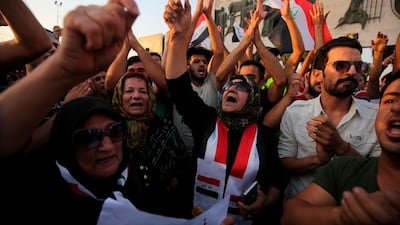The Iraqi Prime Minister has ordered the formation of a committee to investigate corruption amid widespread demonstrations calling for better public services and governance.
Haider Al Abadi said Tuesday evening that Baghdad is in the process of releasing a list of corrupt officials who will face the judiciary.
Since May 12 elections, Iraqi politicians have been negotiating to form a new government. Leading negotiations is populist cleric Moqtada Al Sadr, whose bloc took the largest number of seats in a vote which saw saw long-time political figures lose votes to candidates promising reforms.
"We will hold anyone accountable who delays the implementation of the measures aimed at improving services, the creation of jobs and encouragement of investment," Mr Al Abadi said during a press conference in Baghdad, adding that the government has intensified its efforts to combat corruption.
"We will not tolerate any shortcoming from any official no matter how senior they are," he said.
______________
Read more:
Ayatollah Ali Al Sistani calls for new Iraq government to be formed as soon as possible
Iraq to put election officials on trial over fraud in May's poll
The leaderless protests of southern Iraq see years of neglect boil over
______________
Demonstrations have swept across southern Iraq for the past three weeks, Protesters have railed against power shortages, unemployment, a lack of clean water and state mismanagement.
"It is the duty of the government to deliver good services to all Iraqis, maintain security and safeguard Iraq’s stability," the premier said.
Since the 2003 US-led invasion, Iraqi households have lived with unclean tap water, irregular electricity and decrepit sewerage systems. The situation is particularly acute in Basra, which while a hub for oil exports that account for more than 95 per cent of Baghdad's central government revenue, is also riven with poverty and unemployment.
"We listened carefully to the legitimate demands of recent protests and are now implementing measures to improve the delivery of essential services across Iraq," Mr Al Abadi said.
Last week, the premier sacked his minister of electricity, Qassem Al Fahdawi – whose departure was demanded by protesters – "because of the deterioration in the electricity sector".
Mr Al Sadr meanwhile has issued a set of preconditions for the country's next prime minister.
The cleric said in a statement that the premier must be bilingual, should not hold a dual citizenship, must not be associated to any political party and should prevent foreign interference in the country's affairs.
Mr Al Sadr urged the country's political elite to "unite" in helping the country through its current political impasse.
His surprise poll win last May saw long-time political figures pushed out by voters seeking change.
The initial election results gave a bloc organised by Mr Al Sadr the largest share, with 54 seats in the 329-seat parliament. It was followed by an Iran-backed bloc – made up of Shiite militia leaders – which won 47 seats, and Mr Al Abadi's alliance, with 42 seats.


